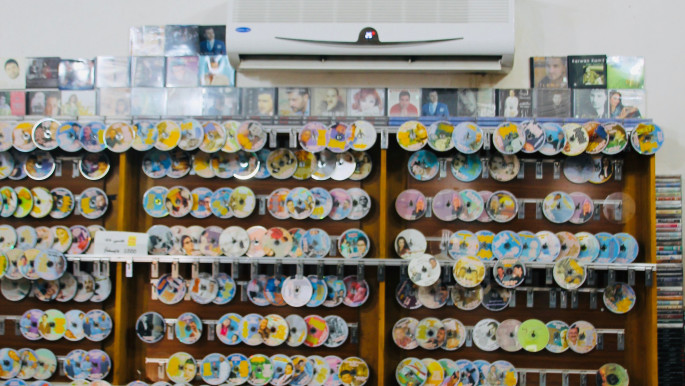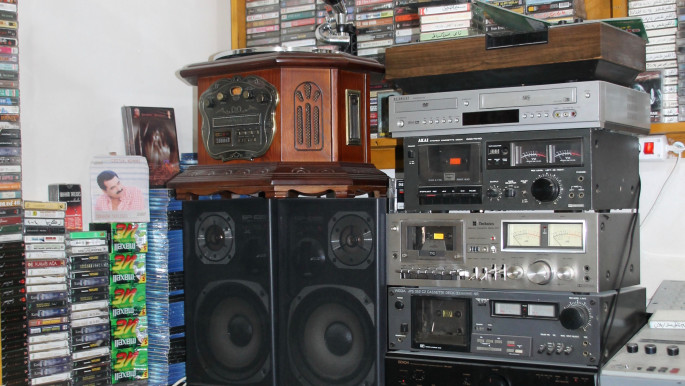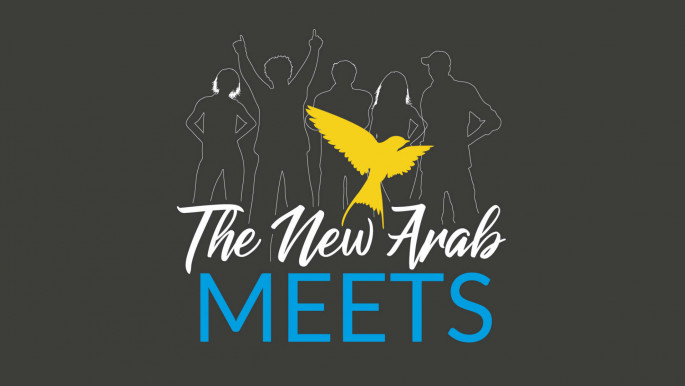In Erbil's citadel, one music lover keeps forgotten Kurdish melodies alive
First established by his grandfather in 1952 in the old city bazaar, the archive – relocated to the citadel in 2017 – is a labour of love for Assad, who has almost single handedly digitised thousands of cassettes and old 78's that span a century of musical history.
"The recordings," he tells The New Arab, "are like my children. They are in my blood." But his stories deserve their own archive.
"I remember in the 50's when (famed maqam singer) Mohammed Erbili was more popular than the president," recalls the wily 64-year-old, who is still active in the music scene and even stage managed Kazem al Saher's last gig in Erbil.
"It used to cost 25 cents to buy a pin with Abdul Qarim Kassem's image on it," he recalls, "but one with Erbili cost 50 cents!"
Erbili, recounts Assad, who was born in the citadel and started singing at the age of six in 1938, was a renowned composer and performer of traditional maqam sung poetry as well as more popular music.
 |
The multicultural nature of the citadel is reflected in the music that emerged from it |  |
He wrote songs for famous Turkish singers like İbrahim Tatlıses, who sang in the popular arabesk style – an Arabic influenced genre popular in the 60's and 70's with Byzantine and Arabic infused melodies and rhythms – as well as borrowings from Balkan and Ottoman baglama or saz music that expresses melancholic love and longing.
 |
|
| [Hadani Ditmars] |
"Erbili was very handsome," explains Assad, "and had a reputation as a 'playboy'." But he was also an ambulance driver and even penned a maqam about driving the injured to hospital.
He was so beloved, says Assad, that when he arrived for a 1961 concert in Kirkuk, the crowd met his car and carried him around on their shoulders before he even sang a note.
Erbili's photo from his mid-century heyday is one of dozens on the wall of the archive, and below it is one of his two brothers, Ahmed and Mahmoud, who were also singers.
While the citadel is the world's oldest continually inhabited settlement, its cultural richness is musical as well as archeological, with melodious layers of history embedded in its very soil.
The multicultural nature of the citadel is reflected in the music that emerged from it – a heady mix of Kurdish, Arabic, Turkoman and Jewish and Muslim heritage.
"Everyone lived here together in harmony," says Assad, who grew up here as well and remembers his mother lamenting the loss of their Jewish neighbours who left in 1948.
The 1920's and 30's were the golden age of a particular strain of Erbili maqam that crossed ethnic and religious boundaries. And in a predominantly male musical world, one of the stars of that scene was Raho – whose mother was Jewish from Sulaymaniyah, and whose father was Turkoman. She was also Assad's grandfather's next door neighbour.
"She sang in five languages," Assad recounts as he pulls a carefully labelled CD from his archive to play me a "wedding song" – a special nuptial maqam for dancing – sung by Raho in 1935. I move my hips and snap my fingers in time to the rapturous beat and soaring melody, imagining a local wedding party that might have danced to this very song a few hundred metres away.
Next Assad plays a maqam sung by another famous Turkmeni Jewish woman singer known as Um Jamal, this one a lament for a lost love – and seemingly a bygone era.
He digs into a drawer and brings out an old reel to reel machine. "I have thousands of recordings no one has heard yet," he tells The New Arab.
But he needs a new machine to convert reel to reel into digital "they're hard to find here" he says, and the current one is on its last legs and doesn't produce the best quality recording.
Assad's mission to keep the archive alive is made more urgent by the fact that many of the songs he has preserved, documented and recorded were banned under the old regime.
 |
Under Saddam Hussein's government, Jewish songs were forbidden and buying and selling them was a crime punishable by death |  |
"Under Saddam Hussein's government," he says, "Jewish songs were forbidden and buying and selling them was a crime punishable by death."
The recording and distribution of Kurdish and Turkoman songs was also repressed, he says.
 |
|
| [Hadani Ditmars] |
He hopes that the new generation of artists in Erbil will appreciate their musical roots, although he remains somewhat of a purist, saying, "The new generation can never surpass the old – their music and their art had a kind of purity you can't find today."
Still his archive is up to date – spanning early 20th century music until today.
Assad rolls off the names of important singers in the 1960's – like Erbil's Shahaba, as well as Mischko and Hassan Hunsei.
A pop singer named Shaii was a hit in the 70's and Osman Hossein was big in the 80's, he tells me.
Today singers like Baktiar Salah and Nuri Gamiani perform a dance beat based mix of old maqam style and new pop music and singers like Dashni Morad are forging their own unique styles.
The old style maqam is kept alive by a handful of artists, he says, like Younis TuTinchy and Maghdid oglu who sings Turkmeni maqam and the likes of Ardalan Blair who sings Kurdish maqam.
Assad's sense of mission seems a natural extension of his own heritage. "I grew up with this job," he tells The New Arab, "Since I was eight-years-old. Without these songs I am a fish out of water who will die in an instant."
It's important for the new generation to learn about their musical heritage, he says. "It's part of our tradition and culture and history. After I'm gone my son Mohammed will carry on this work."
In the meantime, Assad still needs more storage facilities for his mountain of original cassettes and 78's that he's digitising, and backing up on four different hard drives. He hopes to find a sponsor for a "house of maqam" in a nearby citadel building that could become a space for performance and education as well as recording (and to that end has had tentative discussions with UNESCO.)
While the future of Kurdish music beckons, it's clear where his heart is. Before I leave, he plays me another tune by Raho – a plaintive song about heartbreak with a serpentine melody and a lyric that cries, "My love, my dear, my jewel, do not forget me."
As I leave the little hillside shrine to the rich musical heritage of this place, the room reverberates with the sound of pure unadulterated memory.
Hadani Ditmars is the author of Dancing in the No Fly Zone, and has been writing from and about the MENA since 1992. Her next book, Between Two Rivers, is a travelogue of ancient sites and modern culture in Iraq. www.hadaniditmars.com
Follow her on Twitter: @HadaniDitmars
Read more from The New Arab Meets special section below:




